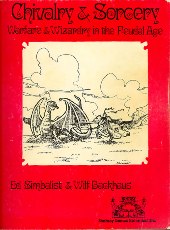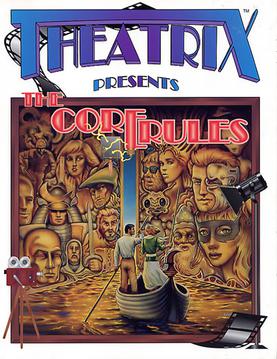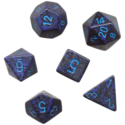
A gamemaster is a person who acts as an organizer, officiant for regarding rules, arbitrator, and moderator for a multiplayer role-playing game. They are more common in co-operative games in which players work together than in competitive games in which players oppose each other. The act performed by a gamemaster is sometimes referred to as "Gamemastering" or simply "GM-ing".

A live action role-playing game (LARP) is a form of role-playing game where the participants physically portray their characters. The players pursue goals within a fictional setting represented by real-world environments while interacting with each other in character. The outcome of player actions may be mediated by game rules or determined by consensus among players. Event arrangers called gamemasters decide the setting and rules to be used and facilitate play.

A role-playing game is a game in which players assume the roles of characters in a fictional setting. Players take responsibility for acting out these roles within a narrative, either through literal acting or through a process of structured decision-making regarding character development. Actions taken within many games succeed or fail according to a formal system of rules and guidelines.

Chivalry & Sorcery is a fantasy role-playing game (FRP) first published in 1977 by Fantasy Games Unlimited. Created by Edward E. Simbalist and Wilf K. Backhaus in 1977, Chivalry & Sorcery (C&S) was an early competitor to Dungeons & Dragons (D&D). The designers of the game were dissatisfied with the lack of realism in D&D and created a gaming system derived from it, named Chevalier. They intended to present it to Gary Gygax at Gen Con in 1977 but changed their minds once at Gen Con once they met Scott Bizar who wrote out a letter of intent. After some changes eliminated the last remnants of D&D, Simbalist and Backhaus published the first edition of their game, now renamed Chivalry & Sorcery.

GNS theory is an informal field of study developed by Ron Edwards which attempts to create a unified theory of how role-playing games work. Focused on player behavior, in GNS theory participants in role-playing games organize their interactions around three categories of engagement: Gamism, Narrativism and Simulation.

The Diana Jones Award is an annual award for "excellence in gaming". The original award was made from a burned book encased in lucite. The award is unusual in two ways: first, it is not an award for a specific class of thing, but can be awarded to a person, product, publication, company, organization, event or trend – anything related to gaming; second, it does not count popularity or commercial success as a sign of "excellence". The award was first presented in 2001.
Fantasy wrestling is an umbrella term representing the genre of role-playing and statistics-based games which are set in the world of professional wrestling. Several variants of fantasy wrestling exist which may be differentiated by the way they are transmitted, the method in which the storyline is determined, and how the roster is composed.

Ronald Edwards is a game designer involved in the indie role-playing game (RPG) community, and a game theorist. He created the Sorcerer role-playing game, the GNS theory of gameplay, and The Big Model. Edwards is also co-founder of The Forge, an online community to support indie RPG design and publication.

The history of role-playing games begins with an earlier tradition of role-playing, which combined with the rulesets of fantasy wargames in the 1970s to give rise to the modern role-playing game. A role-playing game (RPG) is a type of game in which the participants assume the roles of characters and collaboratively create stories. Traditionally all the participants but one take on characters and determine the actions of their characters based on their characterization and the actions succeed or fail according to a system of rules and guidelines, and one of the participants takes on the role of game master who narrates the story, plays all the non-player characters and determine the challenge rating and the outcome of various actions. Within the rules, the participants may improvise freely; their choices shape the direction and outcome of the games.

Fantasy Flight Games (FFG) is a game developer based in Roseville, Minnesota, United States, that creates and publishes role-playing, board, card, and dice games. As of 2014, it is a division of Asmodee North America.

Role-playing games (RPGs) have developed specialized terminology. This includes both terminology used within RPGs to describe in-game concepts and terminology used to describe RPGs. Role-playing games also have specialized slang and jargon associated with them.

A role-playing game theory is the ludology of role-playing games (RPGs); a study of the topic as a social or artistic phenomenon. RPG theories seek to understand what role-playing games are, how they function, and how the gaming process can be refined in order to improve the experience and produce more useful game products.

Live action role-playing games, known as LARPs, are a form of role-playing game in which live players/actors assume roles as specific characters and play out a scenario in-character. Technically, many childhood games may be thought of as simple LARPs, as they often involve the assumption of character roles. However, the scope of this article concerns itself mainly with LARPing in a technical sense: the organized live-action role-playing games whose origins are closely related to the invention of tabletop role-playing games in America in the 1970s.

Theatrix is a role playing game that was produced in 1995 by the now-defunct Backstage Press. It was unusual because, unlike most other role-playing games of the time, it did not use dice to resolve actions or determine success.
A pervasive game is one where the gaming experience is extended out into the real world, or where the fictional world in which the game takes place blends with the physical world. The "It's Alive" mobile games company described pervasive games as "games that surround you," while Montola, Stenros, and Waern's book Pervasive Games defines them as having "one or more salient features that expand the contractual magic circle of play spatially, temporally, or socially." The concept of a "magic circle" draws from the work of Johan Huizinga, who describes the boundaries of play.
Business war gaming or business wargaming is an adaptation of the art of simulating moves and counter-moves in a commercial setting. In a complex global and competitive world, formulating a plan without testing it against likely external reactions is the equivalent of walking into a battlefield without the right weapons or a plan to win. In situations where the cost of being wrong is high, war games can be very helpful to understand from a 360-degree perspective the external opportunities and challenges of all the key stakeholders in the industry.

A tabletop role-playing game, also known as a pen-and-paper role-playing game, is a classification for a role-playing game (RPG) in which the participants describe their characters' actions through speech, and sometimes movements. Participants determine the actions of their characters based on their characterization, and the actions succeed or fail according to a set formal system of rules and guidelines, usually containing Dice-Rolling. Within the rules, players have the freedom to improvise; their choices shape the direction and outcome of the game.

Emily Care Boss is an indie roleplaying game designer, theorist and publisher. She was a foundational member of The Forge, an early leader in the indie role-playing game movement and is considered the creator of the American Freeform genre of roleplaying games, which combine indie RPG principles and mechanics with Nordic freeform and American chamber live action role-playing techniques. She has been referred to as the "Dean" of the North American school of structured freeform game design.

Procedural rhetoric or simulation rhetoric is a rhetorical concept that explains how people learn through the authorship of rules and processes. The theory argues that games can make strong claims about how the world works—not simply through words or visuals but through the processes they embody and models they construct. The term was first coined by Ian Bogost in his 2007 book, Persuasive Games: The Expressive Power of Videogames.

Sivilisasjonens venterom was a research larp held in Bergen in November 2021. It was designed to explore the potential of larps as a research methodology and as research dissemination, and was specifically intended to investigate ethical questions that arise when encountering new surveillance technologies.









